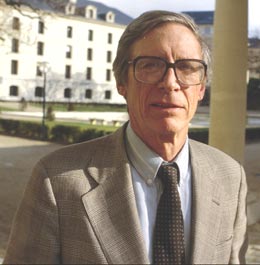John Rawls (1921 - 2002) (Por Pablo MirÃģ Rocasolano)
Su labor como teÃģrico de la
filosofÃa moral y polÃtica (que revitalizÃģ despuÃĐs de un largo letargo) alcanzÃģ
un notable prestigio tras publicar Una TeorÃa de la Justicia (1971), siendo a
partir de entonces una de las personalidades mÃĄs destacadas e influyentes en
este campo a nivel mundial y uno de los filÃģsofos mÃĄs importantes de la segunda
mitad del siglo XX.

Aunque la EconomÃa en sà no es su campo de estudio principal, sus aportaciones se han aplicado a ÃĐste ÃĄmbito, sobre todo en lo referente a Justicia, equidad y toma de decisiones pÚblicas. Rawls defiende un concepto liberal de la justicia; es decir, una decisiÃģn no es mÃĄs justa o menos por los resultados que genere, sino que lo es en funciÃģn de los procesos o mecanismos que conducen a dichos resultados. PosiciÃģn opuesta al utilitarismo, que considera la evaluaciÃģn de resultados para analizar la bondad o maldad de una decisiÃģn pÚblica. Pero es importante que, para que esa idea de justicia sea considerada como tal, se asiente en una situaciÃģn de escasez moderada, donde las necesidades bÃĄsicas (y no tanto materiales o fÃsicas) de la mayor parte del colectivo sujeto a la decisiÃģn, estÃĐn cubiertas.
Aporta asà Rawls un enfoque contractualista, segÚn el cual lo que sea o no justo dependerÃĄ de los acuerdos u organizaciÃģn social del colectivo y de si ÃĐsta es equitativa (porque nadie haga prevalecer sus intereses sobre los demÃĄs) o no. Cuando los individuos no disponen de pleno conocimiento de sus verdaderos intereses se dice, en terminologÃa de Rawls, que pasan por el velo de la ignorancia. En esa situaciÃģn, nadie puede imponer sus intereses, por lo que se puede alcanzar una situaciÃģn justa. Esa situaciÃģn, ademÃĄs, faculta al Estado para la intervenciÃģn en la economÃa, redistribuyendo rentas.
Para garantizar una verdadera justicia, es necesario que cada agente disponga de plena libertad, y que nadie salga perjudicado con la decisiÃģn, supuesto que se permite romper cuando ese perjuicio individual repercute en una ganancia para el colectivo o cuando todos han contado con igualdad de oportunidades.
TambiÃĐn trabajÃģ Rawls el criterio MAXIMIN aplicado a la elecciÃģn de alternativas, eligiendo siempre la que mejora al pobre, situaciÃģn que se reconoce como vÃĄlida sÃģlo en caso de un gran colectivo o ÃĄrea (contrato social), pero no en decisiones que afectan a un nÚmero escaso de individuos. Por ejemplo: podrÃa ser justo que desde el Estado se subvencionara a las empresas peor situadas, a las que tienen pÃĐrdidas, en un contexto global. Pero si se trata de decidir dar una subvenciÃģn a una de dos empresas (una que tiene beneficios y otra que tiene pÃĐrdidas), cabe la posibilidad que no fuera justo dÃĄrsela a la que tiene pÃĐrdidas porque igual no ha hecho mÃĐrito para ello y estÃĄ en esa situaciÃģn por sus propios errores.Rawls vino al mundo en Baltimore (Maryland, USA), en 1921. Doctorado por Princeton University en 1950, desarrollÃģ el grueso de su carrera docente en Harvard, donde fue profesor emÃĐrito.
Entre 1943 y 1945 estuvo enlistado en la InfanterÃa de Estados Unidos, sirviendo en Nueva Guinea, Filipinas y JapÃģn, en la II Guerra Mundial.
Tuvo que reducir su labor como docente en sus Últimos aÃąos de vida, ya que el corazÃģn le ocasionÃģ algunos problemas de salud, aunque no dejÃģ de escribir artÃculos. FalleciÃģ en su casa de Lexington (Massachussets, USA), el Domingo 24 de noviembre de 2002, vÃctima de una insuficiencia cardiaca, dejando viuda a Margeret Warfield Fox Rawls. TenÃa cuatro hijos y cuatro nietos.
CurrÃculum Vitae
-
FormaciÃģn:
Kent School en Kent, Conn.
B.A. degree, Princeton University, 1943.
Ph.D. in philosophy, Princeton University, 1946 - 1950. -
Labor docente:
Instructor en Princeton University, 1950-1952
Profesor asistente y asociado de filosofÃa, Cornell Universty, 1953-1959
Profesor de filosofÃa, M.I.T., 1960-1962
Philosophy Department ; Harvard University, 1962 - âĶ
Conant University Professor, Harvard University, 1979 -
Distinciones:
Doctor of Laws, Harvard University, 1997
National Humanities Medal from the National Endowment for the Humanities, 1999Cargos:
Miembro de:
American Philosophical Association (presidente en 1974)
American Academy of Arts and Sciences
American Association of Political and Legal Philosophy (presidente en 1970-72)
American Philosophical Society
British Academy
Norwegian Academy of Sciences
Phi Beta Kappa
ARTÃCULOS SOBRE JOHN RAWS DISPONIBLES EN INTERNET:
Gorka EtxebarrÃa (FundaciÃģn Canovas del Castillo): Rawls en tela de juicio J. Ricardo Vudoyra Nieto: John Ralws. Una teorÃa de la Justicia Ken Gwertz: John Rawls, influential political philosopher, dead at 81Libros a la venta de John Rawls en FNAC:
-
El derecho de gentes y âuna revisiÃģn de la idea de razÃģn pÚblicaâ
-
Debate sobre el liberalismo polÃtico, junto a JÞrgen Habermas
OBRAS de John Rawls
Libros
-
Theory of Justice (1971)
-
Political Liberalism (1993)
-
The Law of the Peoples (1999)
-
Collected Papers (1999)
-
Lectures on the History of Moral Philosophy (2000), con Barbara Hermann
-
Justice as Fairness: A Restatement (2001)
ArtÃculos
"A Study in the Grounds of Ethical Knowledge: Considered with Reference to Judgments on the Moral Worth of Character" (1950), Ph.D. (Discurso), Princeton University. Resumen en Dissertation Abstracts (1955), 15(4); pÃĄgs. 608-609.
"Outline of a Decision Procedure for Ethics" (1951), Philosophical Review , 60 (2), pÃĄgs. 177-197.
ARTÃCULOS BASADOS EN EL LIBRO
Una TeorÃa de la Justicia (1971):
"A Theory of Justice" (1974); en Eva H. Hanks, A. Dan Tarlock and John L. Hanks, eds., Cases and Materials on Environmental Law and Policy, pp. 8-14. American Casebook Series. St. Paul, Minn.: West. "A Theory of Justice" (1975); en Donald M. Levine and Mary Jo Bane, eds., The `Inequality' Controversy: Schooling and Distributive Justice, pp. 228-251. New York: Basic Books. "A Theory of Justice" (1978); en John Arthur and William H. Shaw, eds., Justice and Economic Distribution, pp. 18-48. Englewood Cliffs, New Jersey: Prentice-Hall. "The Concept of Justice in Political Economy" (1979); en Frank Hahn and Martin Hollis, eds., Philosophy and Economic Theory, pp. 164-169. Oxford Readings in Philosophy. Oxford & New York: Oxford University Press. "An Egalitarian Theory of Justice" (1979); en Tom L. Beauchamp and Norman E. Bowie, eds., Ethical Theory and Business, pp. 35-42. Englewood Cliffs, New Jersey: Prentice-Hall. "Economic Systems" (1979); en Tom L. Beauchamp and Norman E. Bowie, eds., Ethical Theory and Business, pp. 57-63. Englewood Cliffs, New Jersey: Prentice-Hall. "A Theory of Justice" (1979); en Ted Honderich and Myles Burnyeat, eds., Philosophy As It Is, pp. 61-88. Harmondworth & New York: Penguin Books. "A Theory of Justice" (1980); en James Sterba, ed., Justice: Alternative Political Perspectives. Belmont, California: Wadsworth. âCivil Disobedience" (1980); en Joel Feinberg and Hyman Gross, eds., Philosophy of Law. 2d ed., pp. 110-123. Belmont, California: Wadsworth. "A Theory of Justice" (1981); en A.K. Bierman and James A. Gould, eds., Philosophy for a New Generation. New York: Macmillan. âClassical Utilitarianism" (1988); en Samuel Scheffler, ed., Consequentialism and Its Critics, pp. 4-19. Oxford Readings in Philosophy. New York: Oxford University Press.
Reimpresiones:
"Outline of a Decision Procedure for Ethics" (1968); en Judith J. Thomson and Gerald Dworkin, eds., Ethics, pp. 48-70. Sources in Contemporary Philosophy. New York: Harper & Row.
Review of Axel HÃĪgerstrom's (1955); Inquiries into the Nature of Law and Morals (C.D. Broad, tr.). Mind, 64(255): 421-422.
Review of Stephen Toulmin's (1950), An Examination of the Place of Reason in Ethics. Philosophical Review (Octubre de 1951), 60(4):572-580.
"Two Concepts of Rules" (1955), Philosophical Review , 64 (1): pÃĄgs. 3-32
"Two Concepts of Rules" (1968), en Judith J. Thomson and Gerald Dworkin, eds., Ethics, pp. 104-135. Sources in Contemporary Philosophy. New York: Harper & Row.
"Two Concepts of Rules" (1961); en Frederick A. Olafson, ed., Society, Law and Morality, pp. 420-434. Readings in Social Philosophy from Classical and Contemporary Sources. Englewood Cliffs, N.J.: Prentice-Hall.
"Two Concepts of Rules" (1961); en Richard B. Brandt, ed., Value and Obligation: Systematic Readings in Ethics, pp. 230-237. New York & Burlingame: Harcourt, Brace & World.
"Two Concepts of Rules" (1967); en Philippa Foot, ed., Theories of Ethics, pp. 144-170. Oxford Readings in Philosophy. London: Oxford University Press.
"Two Concepts of Rules" (1969); en H.B. Acton, ed., The Philosophy of Punishment: A Collection of Papers, pp. 105-114. New York: St. Martin's Press.
"Two Concepts of Rules"; en Samuel Gorovitz, ed., Utilitarianism: John Stuart Mill: With Critical Essays, pp. 174-194. New York: Bobbs-Merrill.
"Two Concepts of Rules" (1973); en Thomas Schwartz, ed., Freedom and Authority: An Introduction to Social and Political Philosophy, pp. 160-181. Encino & Belmont, California: Dickenson.
"Punishment as a Practice" (1973); en Jeffrie G. Murphy, ed., Punishment and Rehabilitation, pp. 83-91. Basic Problems in Philosophy Series. Belmont, California: Wadsworth.
"Zwei Regelbegriffe" (1975); en Otfried HÃķffe, ed., EinfÞhrung in die utilitaristische Ethik: Klassische und zeitgenÃķssische Texte, pp. 96-120. Munich: Beck (traducciÃģn alemana de JÃķrg Jantzen de "Two Concepts of Rules", 1955)
"Two Concepts of Rules" (1977); en Joel Feinberg and Henry West, eds., Moral Philosophy: Classic Texts and Contemporary Problems, pp. 259-273. Belmont, Calif.: Dickenson.
"Two Concepts of Rules" (1979); en Richard A. Wasserstrom, ed., Today's Moral Problems. 2d ed., pp. 452-460. New York: Macmillan; London: Collier Macmillan.
"Two Concepts of Rules" (1980); en Joel Feinberg, ed., Reason and Responsibility: Readings in Some Basic Problems of Philosophy. 5Š ed. Belmont, California: Wadsworth.
"Punishment" (1980); en Joel Feinberg and Hyman Gross, eds., Philosophy of Law. 2d ed., pp. 577-581. Belmont, California: Wadsworth.
"Two Concepts of Rules" (1981); en John Arthur, ed., Morality and Moral Controversies. Englewood Cliffs, New Jersey: Prentice-Hall.
"Justice as Fairness" (1957), J of Philosophy, y en Philosophical Review (1958), 67 (2), pÃĄgs. 164-194
"Justice as Fairness" (1961); en Frederick A. Olafson, ed., Justice and Social Policy: A Collection of Essays, pp. 80-107. Englewood Cliffs, New Jersey: Prentice-Hall, A Spectrum Book.
"Justice as Fairness" (1969); en Matthew Lipman, ed., Discovering Philosophy, pp. 76-84. New York: Appleton, Century Crofts.
"Justice as Fairness" (1970); en Wilfrid Sellars y John Hospers, eds., Readings in Ethical Theory. 2Š ed., pp. 578-595. Englewood Cliffs, New Jersey: Prentice-Hall.
"Justice as Fairness" (1973); en Richard E. Flathman, ed., Concepts in Social & Political Philosophy, pp. 404-421. New York: Macmillan; London: Collier Macmillan.
"Justice as Fairness" (1976); en James Rachels, ed., Understanding Moral Philosophy, pp. 234-254. Belmont, California: Dickenson.
"Justice as Fairness" (1977); en Maurizio Ferrera y Piero Gastaldo, eds., Le ragioni della giustizia, pp. 25-44. Biblioteca della liberta, 65/66
"Justice as Fairness" (1977); en W.T. Jones, Frederich Sontag, Morton O. Beckner and Robert J. Fogelin, eds., Approaches to Ethics. 3Š ed., pp. 485-504. New York: McGraw-Hill.
"Gerechtigkeit als Fairness" (1977); en Otfried HÃķffe, ed., Gerechtigkeit als Fairness. Reihe praktische Philosophie, 6. Freiburg: Alber, (traducciÃģn alemana de Joachim Schulte de "Justice as Fairness" (1957) y otros artÃculos adicionales)
"Justice as Fairness" (1980); en Joel Feinberg and Hyman Gross, eds., Philosophy of Law. 2Š ed., pp. 338-351. Belmont, California: Wadsworth.
"Justice as Fairness" (1981); en Oliver A. Johnson, ed., The Individual and the Universe: An Introduction to Philosophypp. 239-246. New York: Holt, Rinehart, and Winston.
"Justice as Fairness: Political not Metaphysical" (1985); en Philosophy & Public Affairs, 14(3):223-251.
"La ThÃĐorie de la justice comme ÃĐquitÃĐ: une thÃĐorie politique et non pas mÃĐtaphysique" (1988); en Catherine Audard, Jean-Pierre Dupuy y RenÃĐ SÃĻve, eds., Individu et justice sociale: Autour de John Rawls. Prefacio de François TerrÃĐ. Points. Politique, 132. Paris: Seuil, (Extracto de una conferencia de John Rawls en Paris, 20-21 Marzo, 1987)
"La Justice comme ÃĐquitÃĐ" (1987); Philosophie, 14:39-69, traducciÃģn francesa de Jean-Fabien Spitz de una versiÃģn revisada de "Justice as Fairness" (1958).
Review of A. Vilhelm Lundstedt's (1959); Legal Thinking Revised. Cornell Law Quarterly, 44:169.
Review of Raymond Klibansky (1961), ed., Philosophy in Mid-Century: A Survey. Philosophical Review, 70(1): 131-132.
"The Sense of Justice" (1963), Philosophical Review , 72 (39), pÃĄgs. 281-305
"The Sense of Justice" (1969); en Joel Feinberg, ed., Moral Concepts, pp. 120-140. Oxford Readings in Philosophy. London: Oxford University Press.
"Constitutional Liberty and the Concept of Justice" (1963), C. J. Friedrich and J. Chapman, eds., Nomos, VI: Justice , pÃĄgs. 98-125
"Constituitional Liberty and the Concept of Justice" (1973); en Thomas Schwartz, ed., Freedom and Authority: An Introduction to Social and Political Philosophy, pp. 260-280. Encino & Belmont, California: Dickenson.
"Author's Note" (1973); en Thomas Schwartz, ed., Freedom and Authority: An Introduction to Social and Political Philosophy, p. 260. Encino & Belmont, California: Dickenson. (Una nota de Rawls sobre "Constitutional Liberty and the Concept of Justice" âreimpreso-)
"Constitutional Liberty and the Concept of Justice" (1979); en David Lyons, ed., Rights, pp. 26-45. Belmont, California: Wadsworth.
"Legal Obligation and the Duty of Fair Play" (1964), en S. Hook, ed., Law and Philosophy , pÃĄgs. 3-18
"Distributive Justice" (1967), en Laslett and Runciman, eds., Philosophy, Politics, and Society , Third Series,
"Distributive Justice"; en Robert M. Stewart, ed., Readings in Social and Political Philosophy, pp. 196-211. New York & Oxford: Oxford University Press, 196-211.
âDistributive Justice: Some Addenda" (1968); Natural Law Forum, 13: pÃĄgs. 51-71
"Distributive Justice" (1973); en Edmund S. Phelps, ed., Economic Justice: Selected Readings, pp. 319-362. Penguin Modern Economics Readings. Harmondsworth & Baltimore: Penguin Books. (Incluye el texto completo de "Distributive Justice" (1967) y la parte principal de "Distributive Justice: Some Addenda" (1968))
"Distributive Justice" (1977); en Joel Feinberg and Henry West, eds., Moral Philosophy: Classic Texts and Contemporary Problems, pp. 344-358. Belmont, California: Dickenson.
âChapters on Justiceâ (1968), para Philosophy 171, Harvard University (no publicado).
"The Justification of Civil Disobedience" (1969), en Bedau, ed., Civil Disobedience: Theory and Practice, pp. 240-255. New York: Pegasus Books, 1969.
"The Justification of Civil Disobedience" (1971); en Edward Kent, ed., Revolution and the Rule of Law, pp. 30-45. Englewood Cliffs, New Jersey: Prentice-Hall, A Spectrum Book.
"Justification and Civil Disobedience" (1973); en Richard E. Flathman, ed., Concepts in Social & Political Philosophy, pp. 219-229. New York: Macmillan; London: Collier Macmillan.
"The Justification of Civil Disobedience" (1975); en James Rachels, ed., Moral Problems: A Collection of Philosophical Essays. 2Š ed., pp. 181-194. New York: Harper & Row.
"The Justification of Civil Disobedience" (1975); en Richard Wasserstrom, ed., Today's Moral Problems, pp. 346-358. New York: Macmillan; London: Collier Macmillan.
"The Justification of Civil Disobedience" (1975); en Tom L. Beauchamp, ed., Ethics and Public Policy, pp. 132-145. Englewood Cliffs, New Jersey: Prentice-Hall.
"The Justification of Civil Disobedience" (1986); en Robert M. Stewart, ed., Readings in Social and Political Philosophy, 76-84. New York & Oxford: Oxford University Press.
"Justice as Reciprocity" (1971), en Gorovitz, ed., Utilitarianism: John Stuart Mill: With Critical Essays, pp. 242-268. New York: Bobbs-Merrill, 1971
R
"Justice as Reciprocity" (1976); en Samuel Gorovitz, et al., eds., Moral Problems in Medicine, pp. 443-454. Englewood Cliffs, New Jersey: Prentice-Hall.
"Justice as Reciprocity" (1981); en Charles L. Reid, ed., Choice and Action: An Introduction to Ethics, pp. 292-323. New York: Macmillan; London: Collier-Macmillan.
"Legal Obligation and the Duty of Fair Play" (1971), en Murphy, ed., Civil Disobedience and Violence pp. 39-52. Basic Problems in Philosophy Series. Belmont, California: Wadsworth.
"Reply to Lyons and Teitelman" (1972); Journal of Philosophy, 69 (18): 556-557.
"Some Reasons for the Maximin Criterion" (1974), AER , 64 (2), pÃĄgs. 141-146
"Reply to Alexander and Musgrave." Quarterly Journal of Economics (Noviembre 1974), 88(4):633-655, Comentarios sobre Sidney S. Alexander's "Social Evaluations Through Notional Choice," pp. 597-624, y R. A. Musgrave's "Maximin," pp. 597-624.
"Fairness to Goodness" (1975), Philosophical Review , 84 (4), pÃĄgs. 536-554
"A Kantian Conception of Equality" (1975), Cambridge Review , 96 (2225), pÃĄgs. 94-99
"A Well-Ordered Society" (1979); en Peter Laslett and James Fishkin, eds., Philosophy, Politics and Society. 5th Series, pp. 6-20. New Haven, Conn.: Yale University Press; Oxford: Blackwell.
"A Kantian Conception of Equality" (1980); en Virginia Held, ed., Property, Profits, and Economic Justice, pp. 198-208. Belmont, California: Wadsworth.
"A Kantian Conception of Equality" (1985); en John Rajchman and Cornel West, eds., Post-Analytic Philosophy, pp. 201-214. New York: Columbia University Press.
"A Kantian Conception of Equality" (1986); en Robert M. Stewart, ed., Readings in Social and Political Philosophy, 187-211. New York & Oxford: Oxford University Press.
"The Independence of Moral Theory" (1975), Proceedings and Addresses of the American Philosophical Association, 48; pÃĄgs. 5-22.
"The Basic Structure as Subject." (1977), American Philosophical Quarterly 14(2):159-165
"The Basic Structure as Subject" (1978); en John Arthur and William H. Shaw, eds., Justice and Economic Distribution, pp. 48-52. Englewood Cliffs, New Jersey: Prentice-Hall.
"The Basic Structure as Subject" (1978); en Alvin I. Goldman y Jaegwon Kim, eds., Values and Morals: Essays in Honor of William Frankena, Charles Stevenson, and Richard B. Brandt, pp. 47-71. Dordrecht, Holland & Boston: Reidel, 1978
"Giustizia distributiva." (1977), en Maurizio Ferrera y Piero Gastaldo, eds., Le Ragioni della Giustizia, pp. 45-80. Biblioteca della liberta, 65/66.
"Personal Communication, January 31, 1976" (1978), en Thomas Nagel's "The Justification of Equality." Critica, 10(28):9n4. Reimpreso en Nagel's Mortal Questions, p. 111n4. Cambridge: Cambridge University Press, 1979.
"Kantian Constructivism in Moral Theory" (1980), Journal of Philosophy
"The Basic Liberties and Their Priority" (1982), en McMurrin, ed., Tanner Lectures on Human Values III (1982), pp. 1-87. Salt Lake City: University of Utah Press; Cambridge: Cambridge University Press, 1982
"Les LibertÃĐs de base et leur prioritÃĐ" (1982); en Critique (June-July 1989), 45(505-506): 423-465. TraducciÃģn francesa de Florence Piron de "The Basic Liberties and Their Priority".
"The Basic Liberties and Their Priority" (1987); en Sterling M. McMurrin, ed., Liberty, Equality, and Law: Selected Tanner Lectures on Moral Philosophy, pp. 1-87. Salt Lake City: University of Utah Press; Cambridge: Cambridge University Press.
"Social Unity and Primary Goods" (1982); en A. Sen and B. Wiliams, eds., Utilitarianism and Beyond pp. 159-185. Cambridge: Cambridge University Press; Paris: Editions de la Maison des Sciences de l'Homme, 1982.
"The Idea of an Overlapping Consensus" (1987), Oxford Journal for Legal Studies ), 7(1):1-25.
"L'IdÃĐe d'un consensus par recoupement" (1987); en Revue de Metaphysique et de Morale (Enero-Marzo 1988), 93(1):3-32, traducciÃģn francesa de Alexis Tchoudnowsky de "The Idea of an Overlapping Consensus".
"The Priority of Right and Ideas of the Good." (1988), Philosophy & Public Affairs (Fall 1988), 17(4):251-276.
"La
PrioritÃĐ du just et les conceptions du Bienâ (1988);
Archives de Philosophie du Droit,
33:39-59, traducciÃģn francesa de Alexis Tchoudnowsky y Catherine Audard de
"The Priority of Right and Ideas of the Good" (1988).
Parte de una
conferencia de John Rawls en Paris, 20-21 Marzo 1987.
"The Domain of the Political and Overlapping Consensus" (1989), NYU Law Review 64(2):233-255.
"Themes in Kant's Moral Philosophy" (1989), en Forster, ed., Kant's Transcendental Deductions Deductions: The Three Critiques and the 'Opus postumum', pp. 81-113, 253-256. Stanford Series in Philosophy. Studies in Kant and German Idealism. Stanford, California: Stanford University Press.
âThe Law of Peoples" (1993); Critical Inquiry 20(1): 36-68.
"Reconcilation through the Public Use of Reason" (1995); Journal of Philosophy, 92(3):132-180, Respuesta a Jurgen Habermas p. 109.
BiografÃa elaborada y remitida por:
Pablo
MirÃģ Rocasolano
Licenciado en EconomÃa, Universidad
AutÃģnoma de Madrid (UAM)
Correo e-mail:
pablomirorocasolano@hotmail.com
(agradezco
colaboraciones, sugerencias, crÃticas y avisos de fallos)
| En eumed.net: |
 1647 - Investigaciones socioambientales, educativas y humanísticas para el medio rural Por: Miguel Ángel Sámano Rentería y Ramón Rivera Espinosa. (Coordinadores) Este libro es producto del trabajo desarrollado por un grupo interdisciplinario de investigadores integrantes del Instituto de Investigaciones Socioambientales, Educativas y Humanísticas para el Medio Rural (IISEHMER). Libro gratis |
15 al 28 de febrero |
|
| Desafíos de las empresas del siglo XXI | |
15 al 29 de marzo |
|
| La Educación en el siglo XXI | |







